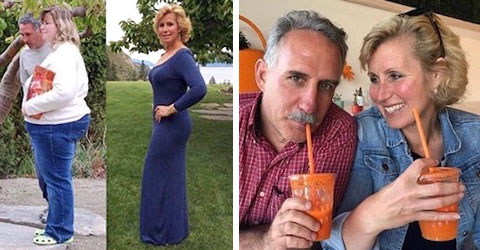
Sheanne had prided herself on feeding her family homemade meat and dairy-based meals, believing that they were much healthier than processed and pre-packaged foods. After gaining weight following each pregnancy and trying numerous diets, Sheanne found herself weighing 300 pounds by 2010. She believed she was destined to be obese for the rest of her life. After stumbling on information about a WFPB lifestyle and reading extensively on the topic, Sheanne went on to lose 133 pounds, regaining her health and vitality. Sheanne received her Plant-Based Nutrition Certificate from CNS and eCornell, which allows her and her husband Dan, a stage IV kidney cancer survivor, to plant the seeds of a WFPB lifestyle through speaking engagements and coaching via their social media platforms at Indian Rock Vegans.
My Whole Food, Plant-Based (WFPB) Story
Our son joined a gym and was told that he would need to take protein powder if he ever wanted to put on muscle. Like a good mother, off to the health food store I went to buy a giant tub of whey powder, but the store clerk quietly suggested that I needed to do some research before letting my kids consume “that stuff.” That surprised me, so I went home and googled “whey protein.” That led me down a rabbit hole of information! I began reading books by Dr. John McDougall, Dr. Caldwell Esselstyn, Dr. Dean Ornish, and finally The China Study by Dr. T. Colin Campbell. That was when I realized I could no longer feed myself or my family in the manner that I had been. I began transitioning my reluctant family in late 2010 to a plant-based diet and fully committed on April 1, 2011. It has been one of the best decisions I’ve ever made, for myself and my family.
My Advice for Beginners
Adopting a plant-based lifestyle is a little like swimming in a cold lake. You can inch in, slowly adjusting to each incremental change, or you can take the plunge, and before you know it, the water feels great! If you’re just curious about a plant-based lifestyle, and you are healthy, then you may have the luxury of wading in. But if you’re dealing with a chronic disease or life threatening diagnosis, you need to jump in with both feet.
I believe that by educating yourself on the science of a whole food, plant-based lifestyle, you are better able to commit fully, knowing that you are doing the best for your health, the health of your family, and ultimately, the planet.
How I Achieved My Health Goals
While I had read countless books on the subject of diet and health, the Plant-Based Nutrition Certificate provided me with a much better understanding of the mechanisms of how diet can impact cancer. For myself and my husband, a deeper understanding further galvanized our commitment and resolve to not only follow a WFPB lifestyle, but to also assist others in adopting this lifestyle. For the past 7 years, I’ve offered my assistance to many via our social media platform “Indian Rock Vegans”.
How the Plant-Based Nutrition Certificate Impacted My Life
Along with my personal studies and reading, the Plant-Based Nutrition Certificate has enabled me to better communicate the science involved in WFPB nutrition and has given me more confidence when addressing audiences at my speaking engagements. Given that the CNS name is highly regarded and widely recognized, my certificate has lent me more credibility with my health coaching and outreach advocacy work.
We were fortunate to be included in the critically acclaimed health documentary “Eating You Alive”.. The film has given us a platform to discuss my weight loss and Dan’s survival of Stage IV kidney cancer and to educate people about the benefits of a plant-based lifestyle. Armed with the knowledge I gained from the Plant-Based Nutrition Certificate course, I will continue to plant the seeds of WFPB nutrition.
You Might Also Like
Copyright 2026 Center for Nutrition Studies. All rights reserved.
Deepen Your Knowledge With Our
Plant-Based Nutrition
Certificate
Plant-Based Nutrition Certificate
- 23,000+ students
- 100% online, learn at your own pace
- No prerequisites
- Continuing education credits












